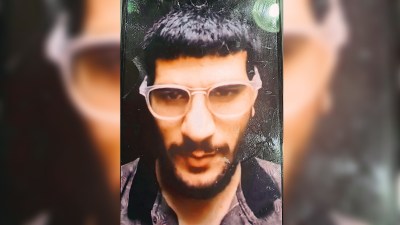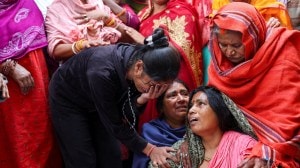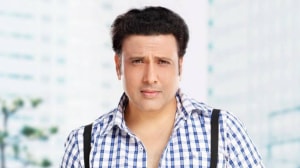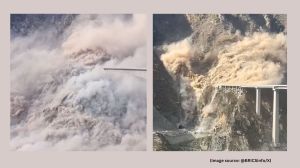US links India talk to Pak action
India and Pakistan should embark on a ‘‘parallel process’’ in which New Delhi offers dialogue on all issues, including K...

India and Pakistan should embark on a ‘‘parallel process’’ in which New Delhi offers dialogue on all issues, including Kashmir, and Islamabad responds by bringing cross-border terrorism to an end, US Ambassador to India Robert Blackwill said here today.
In an interview to The Indian Express, Blackwill clearly spelt out Washington’s views on the diplomatic steps the nuclear-hostile neighbours should now undertake, as a follow-up to their reciprocal military de-escalation as well as in the aftermath of the successful elections in Kashmir and the polls in Pakistan.
‘‘Our view is that these things should go in parallel. We and the others will continue to work very hard in Islamabad to promote the objective of no more terrorism emanating from Pakistan and Pakistan-occupied territory. But at the same time, India and Pakistan should resume a serious discussion about their differences,’’ Blackwill said.
The US envoy followed up his blunt commentary by later meeting Principal Secretary Brajesh Mishra, the key interlocutor on the Indo-US relationship, and Foreign Secretary Kanwal Sibal today, signalling that the US was willing to bring both its power and influence to bear upon Musharraf’s Pakistan to end terrorism, even as New Delhi offered to hold talks at any level.
This idea of simultaneity could well become the key to breaking the stranglehold of preconditions that both countries have employed at different times since Kargil, analysts here said.
Clearly, the US hopes that in the aftermath of the ‘‘successful and credible’’ elections in Kashmir, which it went out on a limb to support, New Delhi will have enough elbow room to make diplomatic overtures to Pakistan.
These would not only include the return of the Indian High Commissioner to Islamabad, but also aim at ending popular hostility by restoring bilateral air and rail links.
Keenly aware that New Delhi needed to save face with its own people after Kargil, the failed summit at Agra, the attack on Parliament as well as the high border crisis this summer, Blackwill emphasised in the interview that a Pakistan’s complete end to terrorism was an ‘‘absolutely crucial part’’ to the success of the strategy-in-the-making.
The US envoy also seconded New Delhi’s old 8-point offer of composite dialogue, of which Kashmir is one part, indicating that Washington did not agree with Islamabad’s repititive insistence on it being the ‘‘core issue.’’
But he returned again and again to the need for bilateral dialogue.
‘‘If India and Pakistan do not discuss their differences seriously and in a prolonged way, why is this crisis ever going to go away?’’ Blackwill asked.
Denying that the US was so taken up with Iraq that it had no more time for the India-Pakistan story, Blackwill pointed out that Secretary of State Colin Powell had precisely spoken about these issues to General Musharraf ‘‘less than 36 hours ago’’ as well as to External Affairs Minister Yashwant Sinha over the last 24 hours.
‘‘We have stamina on this, because we think it’s important in principle that terrorism against India ends,’’ the US Ambassador said, adding, ‘‘This is not a record of disengagement. We have major equities in the transformation of the India-US relationship, with respect to our relationship with Pakistan, as well as with Pakistan’s assistance in the war against terrorism, Al-Qaeda, Afghanistan, and those are not going to go away.’’
But even as he sought to distinguish between his country’s offer of ‘‘good offices’’ and ‘‘mediation,’’—the former had to do with process, while the latter dealt with solutions, he said—Blackwill was also suggesting that both nations control the stench of negative rhetoric.
His own experience during the decade-long negotiations between the US and the former Soviet Union, he admitted, had given him an insight into the history of nations in conflict.
‘‘The record of that decade-long confrontation is that one side or the other would refuse to talk without precondition. I think history shows that it’s almost always a mistake. Sometimes Moscow would put up that precondition, sometimes Washington would, it was almost always a mistake. It’s much better to discuss, take apart, analyse, illuminate differences,’’ the US envoy added.
Read the complete interview






- 01
- 02
- 03
- 04
- 05

























